You know how humans are good at judging others? We’ve been doing it for centuries, and sometimes it helps us survive and sometimes it makes us suffer. And now that we have all kinds of media to connect us with the world, we can judge even more easily.
But even after all these years, we still haven’t learned how to respect each other, or at least keep our mouths shut when we don’t know what we’re talking about. If you don’t understand something, don’t bash it. Learn about it. See where your judgments come from. But this is a story about the other side—the ones who think their judgments are worth sharing.
A news anchor from New Zealand, who has a traditional face tattoo that shows her Māori roots, got sick of a man who kept complaining about her appearance. She decided to clap back and tell him off.
Oriini Kaipara, a New Zealand news anchor with a traditional face tattoo had been receiving complaints from a man and responded in the best way possible
 Oriini Kaipara made history in 2021 when she became the first person with moko kauae—Māori tattoos on her chin—to host a national primetime news show in New Zealand. She started on Newshub in December 2021, and many people celebrated her achievement as a victory for Māori representation.
Oriini Kaipara made history in 2021 when she became the first person with moko kauae—Māori tattoos on her chin—to host a national primetime news show in New Zealand. She started on Newshub in December 2021, and many people celebrated her achievement as a victory for Māori representation.
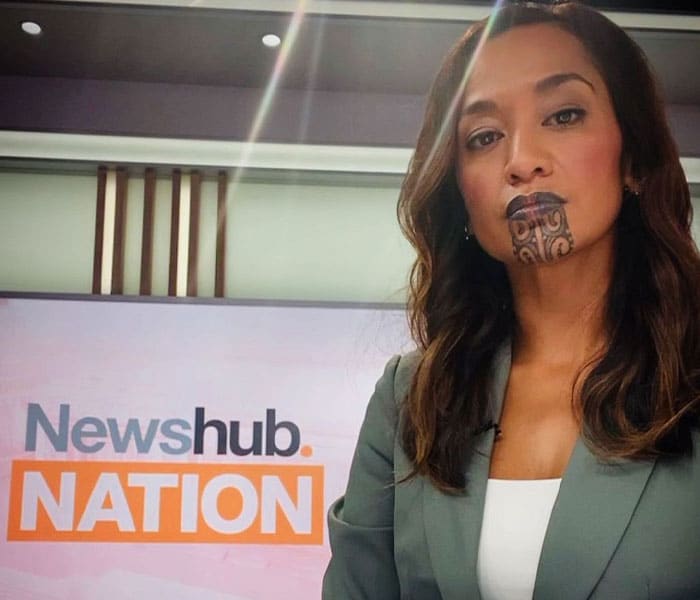
Tā moko is a way of expressing cultural heritage and identity through tattooing, and for Māori, the head is the most sacred part of the body, so facial tattoos are very important. Moko kauae are worn by women on their lips and chins, and they show their ancestry, status, and skills. It’s a tradition that goes back to the ancestress Niwareka.
Before Europeans came, tā moko was done by carving the skin with tools made from albatross bone, dipped in dark pigment, and hit with small hammers called tā. The pigment was made from soot from burning white pine or hebe, sometimes mixed with kauri gum.
Although many praised her for honoring her culture, there were those like David, who found the look “offensive and aggressive looking”
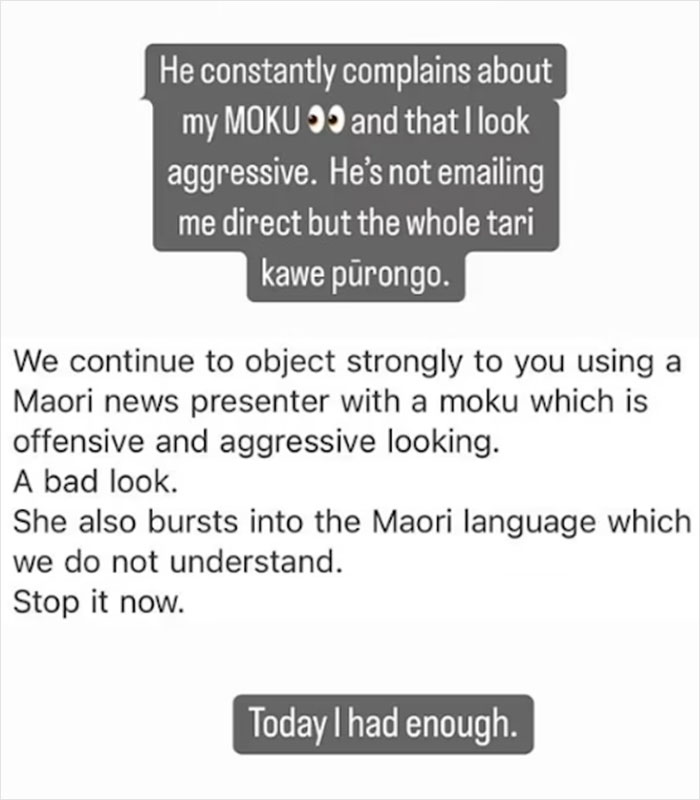 Oriini got a lot of support for honoring her culture, but there were also some haters.
Oriini got a lot of support for honoring her culture, but there were also some haters.
One man, named David, was on a mission to get her off the air. He kept sending letters to the news station, asking them to fire her as a news anchor because he didn’t like her looks or her use of Māori language.
Oriini shared one of his messages on her Instagram stories: “We continue to object strongly to you using a Māori news presenter with a moku (sic), which is offensive and aggressive-looking. A bad look. She also bursts into the Māori language, which we do not understand. Stop it now.”
She had enough of his rude and ignorant comments. “This guy is one of ‘those’ gifts that keep on giving,” she wrote on her Instagram story. “He constantly complains about my MOKU and that I look aggressive. He’s not emailing me directly, but the whole tari kawe pūrongo. Today I had enough.”
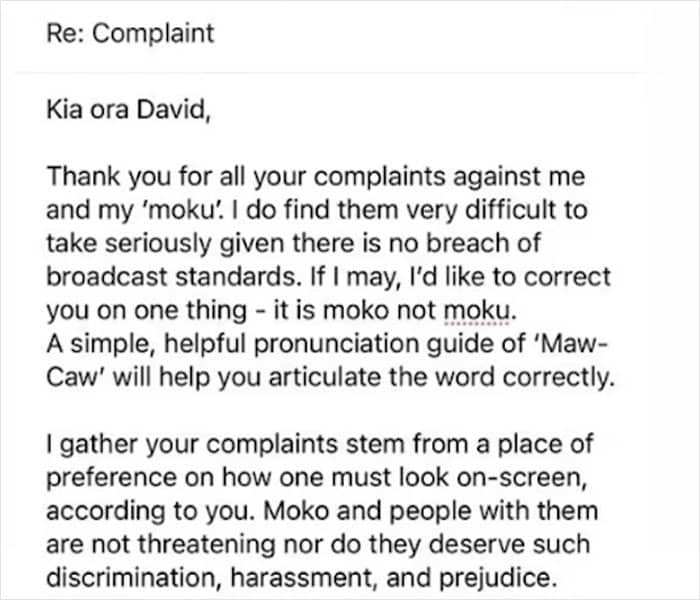 She wrote back to him: “Kia ora (trans. hello) David, Thanks for all your complaints about me and my ‘moku.’ I find them hard to take seriously since there is no breach of broadcast standards. If I may, I’d like to correct you on one thing: it’s moko, not moku. A simple, helpful pronunciation guide for ‘Maw-Caw’ will help you say the word right.”
She wrote back to him: “Kia ora (trans. hello) David, Thanks for all your complaints about me and my ‘moku.’ I find them hard to take seriously since there is no breach of broadcast standards. If I may, I’d like to correct you on one thing: it’s moko, not moku. A simple, helpful pronunciation guide for ‘Maw-Caw’ will help you say the word right.”
“I guess your complaints come from a place of preference on how one should look on-screen, according to you. Moko and the people with them are not scary or deserving of such discrimination, harassment, and prejudice.
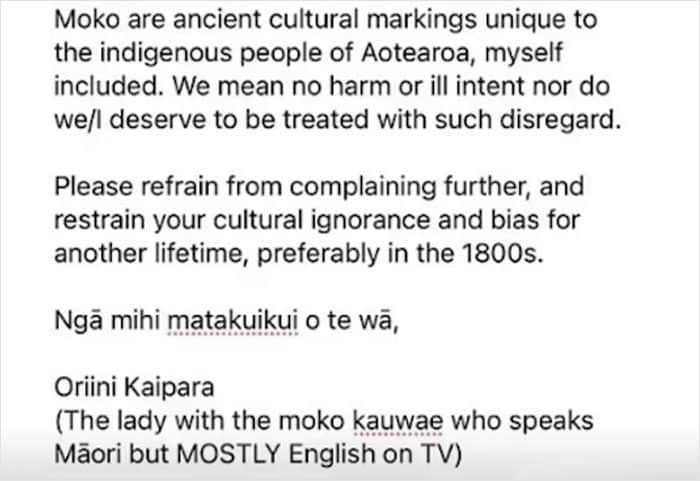
“Moko are ancient cultural markings unique to the indigenous people of Aotearoa, including me. We don’t mean any harm or ill will, nor do we or I deserve to be treated with such disrespect.”
“Please stop complaining, and keep your cultural ignorance and bias to yourself, or better yet, leave them in the past, preferably in the 1800s.” She thanked him for his time in the Māori language and signed the letter as “the lady with the moko kauae who speaks Māori but MOSTLY English on TV.” With love and sass, indeed!
“The fact that my existence triggers some people is testament to why we need more Māori advocates in key roles across every sector,” she said
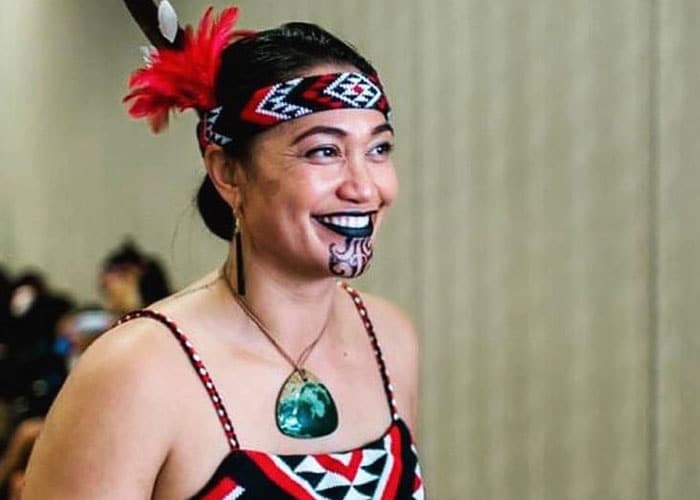 Thankfully, such messages are outliers in the overall supportive sea of messages Oriini receives. “The fact that my existence triggers some people is testament to why we need more Māori advocates in key roles across every sector,” she told the NZ Herald.
Thankfully, such messages are outliers in the overall supportive sea of messages Oriini receives. “The fact that my existence triggers some people is testament to why we need more Māori advocates in key roles across every sector,” she told the NZ Herald.
“Ehara taku toa i te toa takitahi, engari he toa takitini. Success is not the work of an individual but the work of many.”
“When I doubt myself, and I see my reflection in the mirror, I’m not just looking at myself,” she told CNN
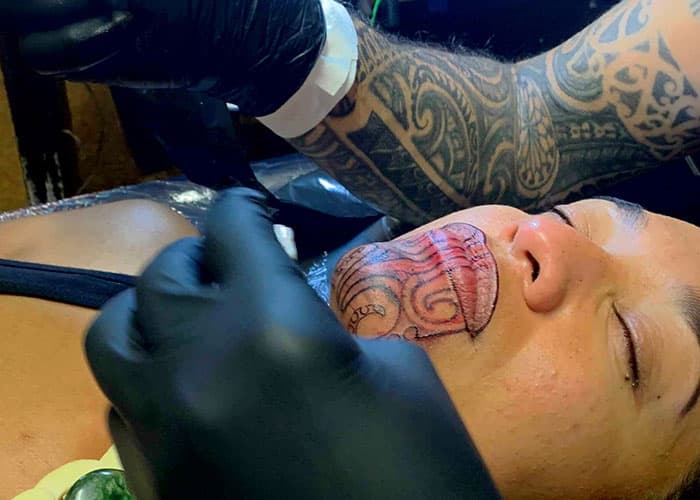 “I’m looking at my grandmother and my mother, and my daughters, and those to come after me, as well as all the other women and Māori girls out there. It empowers me”
“I’m looking at my grandmother and my mother, and my daughters, and those to come after me, as well as all the other women and Māori girls out there. It empowers me”
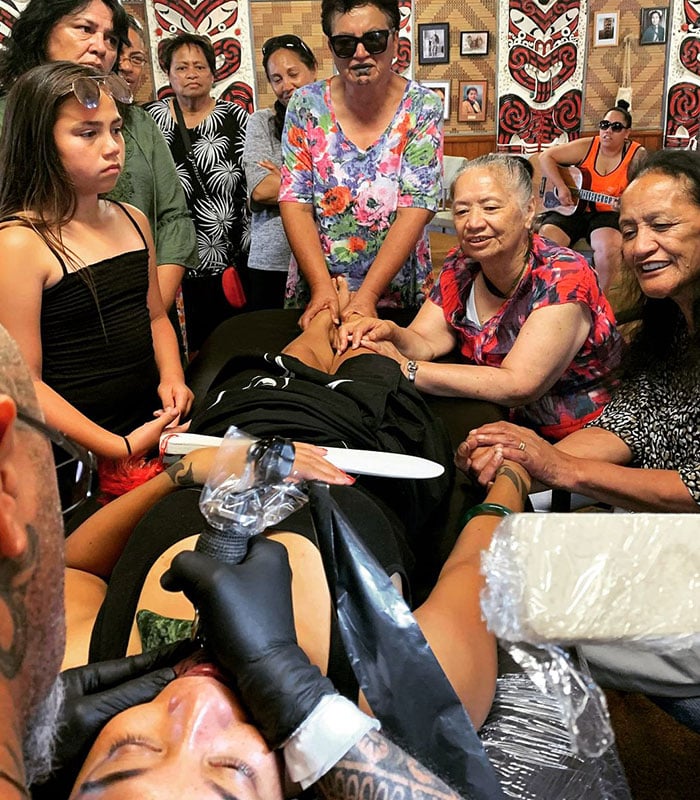 Oriini decided to get the tattoo in 2019 after finding out she was 100 percent Māori from a DNA test in 2017. She belongs to the Tūhoe, Ngāti Awa, Tūwharetoa, and Ngāti Rangitihi tribes. “When I doubt myself and I look at myself in the mirror, I’m not just seeing me,” she told CNN. “I’m seeing my grandmother and my mother, and my daughters, and those who will come after me, as well as all the other women and Māori girls out there. It gives me strength.”
Oriini decided to get the tattoo in 2019 after finding out she was 100 percent Māori from a DNA test in 2017. She belongs to the Tūhoe, Ngāti Awa, Tūwharetoa, and Ngāti Rangitihi tribes. “When I doubt myself and I look at myself in the mirror, I’m not just seeing me,” she told CNN. “I’m seeing my grandmother and my mother, and my daughters, and those who will come after me, as well as all the other women and Māori girls out there. It gives me strength.”
She’s also a passionate advocate for the Māori language, often using phrases like “E haere ake nei” (still to come), “Ū tonu mai” (stay with us), and “Taihoa e haere” (don’t go just yet). Her ultimate goal, she told CNN, is to inspire people to speak the language that was “beaten out of [her] grandmother’s generation” and reclaim it for Māori people.
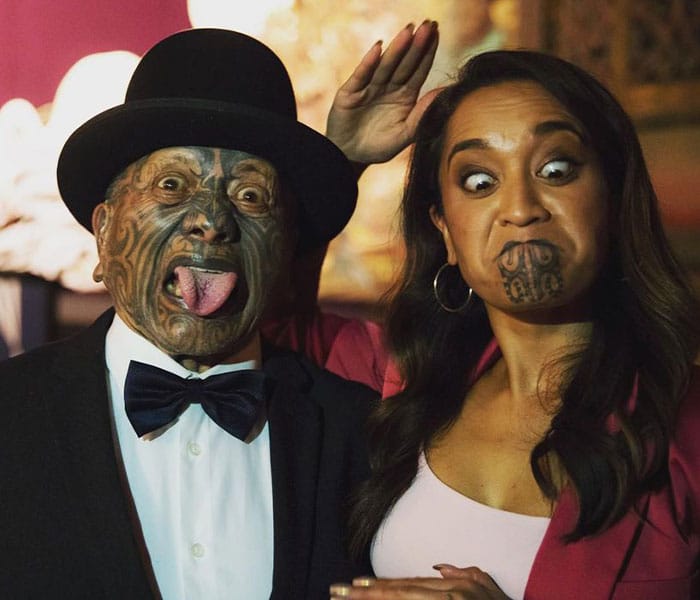
“We still haven’t dealt with a lot of intergenerational traumas and colonization, and for Māori, that’s very, very important and moving as well,” Oriini said. “Not much in terms of race relations here has improved in a long time.” But this is just the start.
Oriini hopes that her story will motivate generations of Māori youth, and they’ll see that times are finally changing. “For a long time, our people, our ancestors, our tipuna, and us now have done so much work to get to where we are,” she told CNN.
“As a young woman, as a young Māori, what you do today affects what happens tomorrow. So all I ask is that they see the beauty in being Māori, embrace it, acknowledge that, and do what they can with it for positive change.”
We wish Oriini all the best for the future—keep slaying the haters with style! Let us know your thoughts in the comments below, and make sure to upvote and follow the author so as to keep justice coming! Poroporoaki mo naianei!

